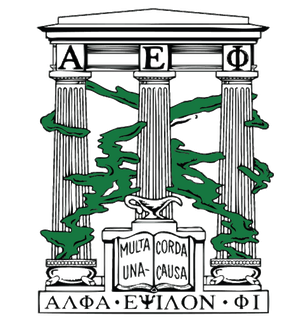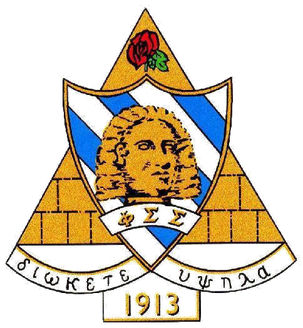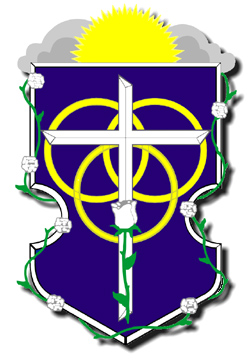
Kappa Alpha Theta (ΚΑΘ), commonly referred to simply as Theta, is an international women’s fraternity founded on January 27, 1870, at DePauw University in Greencastle, Indiana. It was the first Greek-letter fraternity established for women. The organization has 147 chapters at colleges and universities in the United States and Canada. The organization was the first women's fraternity to establish a chapter in Canada. Theta's total living initiated membership, as of 2020, was more than 250,000. There are more than 200 alumnae chapters and circles worldwide.

Pi Beta Phi (ΠΒΦ), often known simply as Pi Phi, is an international women's fraternity founded at Monmouth College, in Monmouth, Illinois on April 28, 1867, as I. C. Sorosis, the first national secret college society of women to be modeled after the men's Greek-letter fraternity.

Delta Zeta is an international college sorority founded on October 24, 1902, at Miami University in Oxford, Ohio. Delta Zeta has 163 collegiate chapters in the United States and Canada, and over 180 alumnae chapters in Canada, the United Kingdom, and the United States. As of 2013, there are over 300,400 college and alumnae members, making it the third largest sorority in the nation.

Theta Phi Alpha (ΘΦΑ), commonly known as Theta Phi, is a women's fraternity founded at the University of Michigan – Ann Arbor on August 30, 1912. Theta Phi Alpha is one of 26 national sororities recognized in the National Panhellenic Conference. Today, Theta Phi Alpha has 54 active chapters across the United States. Theta Phi has alumnae clubs and associations in almost every major city. The organization is involved in the philanthropies Glenmary Home Missioners and The House that Theta Phi Alpha Built which help the homeless and underprivileged, specifically in the Appalachian Mountain region, and Camp Friendship, a summer camp in northeast Mississippi for children from disadvantaged and low-income homes.

Kappa Delta was the first sorority founded at the State Female Normal School, in Farmville, Virginia.

Sigma Kappa is a sorority founded on November 9, 1874 at Colby College in Waterville, Maine.

alpha Kappa Delta Phi (αΚΔΦ), also known as aKDPhi, Kappa Delta Phi, KDPhi, is an international Asian-interest sorority founded at the University of California, Berkeley. alpha Kappa Delta Phi has established 67 chapters and colonies at numerous universities across the United States and in Canada. It is part of the National APIDA Panhellenic Association (NAPA), which it helped charter in 2006.

Alpha Epsilon Phi is an American sorority and a member of the National Panhellenic Conference. It was the second Jewish sorority formed in the United States.

Phi Sigma Sigma (ΦΣΣ), colloquially known as Phi Sig, was the first collegiate nonsectarian sorority to allow membership of women of all faiths and backgrounds.

Kappa Delta Chi Sorority, Inc. (ΚΔΧ), also known as K-D Chi, is a Greek letter, intercollegiate Latina sorority founded at Texas Tech University in 1987. It is a member of the National Association of Latino Fraternal Organizations.

Sigma Phi Lambda (ΣΦΛ), also known as Sisters for the Lord or Phi Lamb, is a Christian sorority founded in 1988 in Austin, Texas.
While most of the traditional women's fraternities or sororities were founded decades before the start of the 20th century, the first ever specifically Christian-themed Greek Letter Organization formed was the Kappa Phi Club, founded in Kansas in 1916. Kappa Phi was a women's sisterhood that developed out of a bible study and remains one of the largest nationally present Christian women's collegiate clubs today. Later organizations added more defined social programming along with a Christian emphasis, bridging the gap between non-secular traditional sororities and church-sponsored bible study groups, campus ministries and sect-based clubs and study groups.

Alpha Omega Epsilon (ΑΩΕ) is a social and professional sorority for women in engineering and technical sciences. The sorority was founded at Marquette University in 1983. There are 48 active chapters of the sorority.

Alpha Sigma Kappa – Women in Technical Studies is a social sorority for women in the fields of mathematics, architecture, engineering, technology and the sciences.

Zeta Phi Eta (ΖΦΗ) is a national professional fraternity for communication arts and sciences. It was founded in 1893, and is recognized as the oldest professional fraternity for women, though membership is now co-ed.

Iota Alpha Pi (ΙΑΠ) was an international collegiate sorority operating in the United States and Canada from March 3, 1903 to July 1971, when it ceased operations. It was then restarted when Alpha chapter was rechartered at Hunter College in October 2023. As of November 2024, the Alpha chapter has been suspended by Hunter College.

Alpha Delta Theta (ΑΔΘ) was a national collegiate sorority operating in the United States from 1919 to 1939. The sorority officially affiliated with Phi Mu fraternity on August 30, 1939.
Phi Omega Pi (ΦΩΠ) was a national collegiate sorority operating in the United States from 1922 until 1946 when its chapters were absorbed by several larger sororities, and merged with the national sorority, Delta Zeta.

Delta Psi Kappa (ΔΨΚ) was an American professional fraternity for women in the disciplines of health and physical education, health sciences, and recreation that was established in 1916. It absorbed Phi Delta Pi in March 1970 and added chapters through the mid-1970s.


















